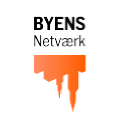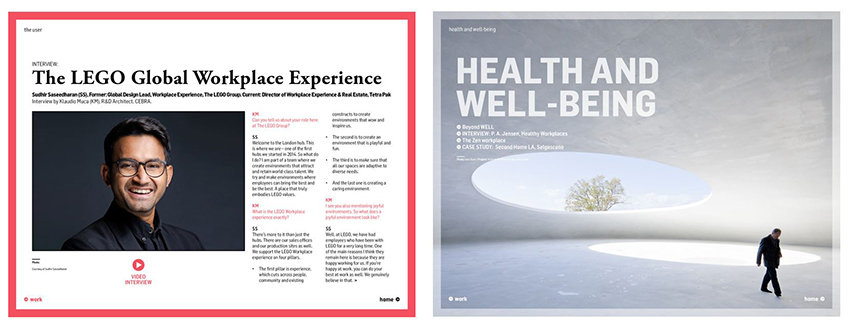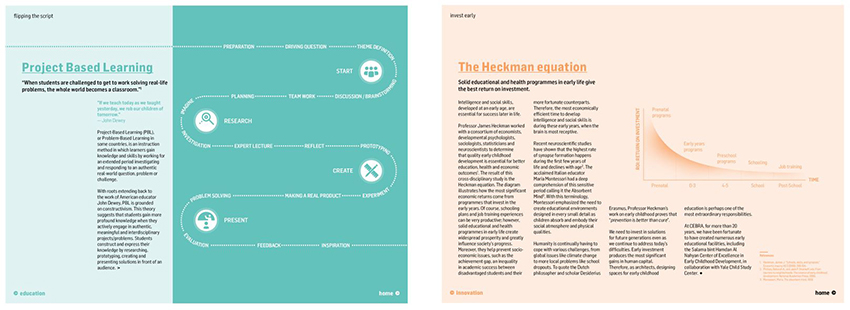

Udgivet d. 31. maj 2022
Danish design and architecture practice, CEBRA, launches the WISE Journal – an extensive mixed-media publication resulting from their R&D program, WISE. The WISE Journal investigates the dynamic relationship between architecture, humans, and human activities in learning and work environments by bringing into conversation different scientific disciplines and some of the world's foremost thinkers. So, how is the future of architecture based on more than functionality? This publication offers its readers food for thought on how to translate this cross-disciplinary exploration into fulfilling, long-lasting architecture – intentionally stimulating spaces that support productivity, learning, and well-being.
Current technological advancements and the consequent rapid change make our ability to create, collaborate, and contemplate imperative to a fulfilling school and work life. The ways we learn, work and meet are continually evolving. Therefore, it is crucial that our buildings are intentionally designed to be conducive and able to adapt to our ever-evolving needs.
“People are different - they have different personalities, preferences, and intelligences. Their needs are diverse, complex, and ever-changing. Nevertheless, the indoor environments where we spend 90 % of our time, often offer homogenous spaces characterized by a uniformity of materials and scales, and steady temperature, light, and acoustic levels. Moreover, the emotional impact of spaces on individuals has mostly been incidental and unclear,” says Klaudio Muca, R&D Architect at CEBRA. He adds: “With the WISE Journal we are looking into a more informed way of designing to intentionally stimulate people’s sensory apparatus and to thereby affect their well-being and the capacity to concentrate, communicate, create, and engage in social relationships.”
A curiosity maze
What is the psychological impact of architecture? And how do buildings affect well-being, learning, productivity, and communities? The WISE Journal is curious about the answers to these questions and studies them by looking into a very broad cross-professional field including neuroscience, cognitive psychology, organizational behavior, environmental psychology, creativity, learning, and innovation.
“With WISE we explore the complex and dynamic relationship between architecture and humans. The journal is not a manifesto, but a body of knowledge that you can carry with you when developing future buildings and spaces,” says Klaudio Muca.
The WISE Journal comprises written and video interviews with some of the world’s foremost thinkers from companies such as The LEGO Group, Spotify, and Pinterest, as well as institutions like the University of Toronto, Politecnico di Milano, Design for Change, The Danish Technical University, etc. Moreover, the publication features more than 65 essays and several case studies that search and showcase how stimulating architecture can support well-being, learning, and productivity.
WISE is a compilation of the words ‘Work, Innovation, Space and Education, and the R&D program originates from CEBRA’s more than 20 years of experience designing innovative workspaces and educational environments. The WISE Journal has been conducted by CEBRA’s founding partner and architect, Carsten Primdahl, and R&D architect, Klaudio Muca.
Medlemmer af Byens Netværk kan (i en begrænset periode) downloade publikationen GRATIS ved at indtaste rabatkoden: Byens-netværk22


ABOUT CEBRA
CEBRA is a Danish architecture and design practice founded in 2001 by architects Mikkel Frost, Carsten Primdahl, and Kolja Nielsen. In 2017, architect Mikkel Hallundbæk Schlesinger entered the group of partners. CEBRA creates architecture to move people. By combining a deep understanding of the project context and the client’s needs with a strong artistic ambition, CEBRA designs meaningful spaces that inspire people, stimulate the senses, connect to nature, and encourage positive change.
FOR FURTHER INFORMATION
Laura Sofie Toftdahl, Head of Communications, CEBRA
T: +45 30240400 E: lau@cebraarchitecture.dk
Top photo: From the left, Carsten Primdahl - founding partner and architect at CEBRA, and Klaudio Muca - R&D architect at CEBRA.
